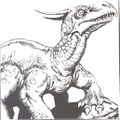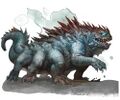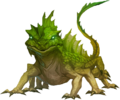Basilisk: Difference between revisions
No edit summary |
m (75 revisions imported) |
||
| (66 intermediate revisions by 40 users not shown) | |||
| Line 1: | Line 1: | ||
'' This article is about the creature. For the [[Imperial Guard]] artillery piece, see [[Basilisk Artillery Gun]].'' | |||
:''Rejoice not thou, whole Philistia, that the rod of him that struck thee is broken in pieces: | |||
:''for out of the root of the serpent shall come forth a basilisk, and his seed shall swallow the bird. | |||
:-Isiah 14:29 | |||
A '''Basilisk''' is a mythological creature, always described as reptilian and deadly. Its name comes from Greek phrase for "little king," and was considered to be lord of all serpents. The first recorded mention of a basilisk described it as a snake about twelve fingers long (~5"-28" long, depending on the size of your hands and how you orient your finger), and it was so venomous that it would kill plants just by passing by (back then people assumed snakes poisoned victims via their breath rather than any sort of fluid injection, no really. To be fair, some snakes can [https://en.wikipedia.org/wiki/Black_mamba spit their venom]), and it would kill you just by looking at you. You were supposed to kill it with weasel musk -- I'm not joking. | |||
The modern-day "green basilisk" or "plumed basilisk" is a little lizard that can run across the surface of water like wire-fu ninjas do, or reptile Jesus, or Remo Williams, or that movie "American Ninja." | |||
[[ | Somewhere along the way, the basilisk's ability to kill with its gaze was "clarified" to mean that anyone who locked eyes with it would be turned to stone (maybe through conflation with [[Medusa]]'s similar ability), and thus we have the modern image of the basilisk. | ||
It's generally accepted that basilisks are related to [[cockatrice]]s, which are usually depicted as some hybrid of snake or dragon and chicken; a cockatrice happens when a rooster's egg is hatched under a toad or snake, whilst a basilisk is created by hatching a snake's egg under a hen (medieval Europeans had some pretty weird assumptions about nature). | |||
== Dungeons & Dragons == | |||
[[File:Basilisk 1e.jpg|right|300px]] | |||
Since a lizard whose mere presence and gaze are deadly makes for a great hazard to [[adventurer]]s, every edition of [[Dungeons & Dragons]] since the beginning has featured basilisks as enemies. The D&D basilisk is unique in its appearance, which is a rather crocodilian reptile with eight legs. | |||
;Original [[D&D]] "Basic" edition: | |||
:Move: 60 feet/turn HitDice: 6+1 ArmorClass: 4 TreasureType: F Alignment: neutral Attacks: 1 bite Damage: d10 | |||
:A rather small reptilian monster, unintelligent, that turns creatures to stone by its glance or its touch. Saving throws applicable. It can be viewed in a mirror without harm. If it sees its own eyes in a mirror it must make a saving throw or be turned to stone! | |||
;D&D 3.5 edition: | |||
:Medium Magical Beast, 6d10+12 HD, -1 Initiative, 20' speed, AC 16 (-1 Dex, +7 natural), Attacks: +6/+8, bite (1d8+3), SAtks: Petrifying Gaze (range 30', save Fort+Cha DC13 or turn to stone), SDef: Darkvision, low-light vision, Saves: +9 Fort +4 Ref +3 Will, S15 D8 Cn15 I2 W12 Ch12, Skills: +7 Listen +7 Spot +4 Hide in dessert, Feats: Alertness, Blindfight, Great Fort, Env: warn desserts, #encountered: 1 or 3-6, ChallengeRating: 5, Alignment: neutral. | |||
:A basilisk relies on its gaze attack, biting only when opponents come within reach. Though it has eight legs, its slow metabolism renders it relatively sluggish, so it does not expend energy unnecessarily. Intruders who flee a basilisk rather than fight can expect, at best, a halfhearted pursuit. These creatures tend to spend most of their time lying in wait for prey, which includes small mammals, birds, reptiles, and similar creatures. | |||
;D&D 4e: | |||
:Large Natural Beast (reptile), L10 Artillery, L12 Soldier. | |||
:Basilisks are predatory reptiles that hunt with a deadly gaze attack. They are not malicious creatures, but their gaze makes them widely feared. A small pack of wild basilisks is called a clutch. Like a wolf pack, a clutch coordinates to hunt and its members live together in a communal den. Tamed basilisks can be found among various humanoids. (PHB1, P26) Two varieties are presented; the more mythologically accurate Venom-Eye (poison gaze) and the more pop-culture accurate Stone-Eye (petrify gaze). | |||
:''[[Bear Lore|Basilisk Lore]]'': A character knows the following information with a successful Nature check. | |||
::'''DC 15:''' Basilisks are strangely evolved drakes. As such, they can be domesticated and trained. | |||
::'''DC 20:''' The venom-eye basilisk's poisonous gaze is empowered by the beast's spirit. The creature itself isn't venomous; consequently, the venom can't be captured and used for other purposes. | |||
::'''DC 25:''' A stone-eye basilisk's jaws are so strong that it can chew up and devour creatures it has petrified with its gaze. | |||
The Monster Vault, a reprint of the Monster Manual with improved maths and expanded fluff for 4e's "Essentials" line, added several new versions; the Mesmeric-Eye Basilisk ([[Enchanter|Take a wild guess]]), the Wilt-Eye Basilisk (enervating gaze that drains the life from anything it looks at) and the Abyssal Basilisk (floods the minds of anyone who meets its gaze with such horrific visions of the [[Abyss]] that they can die of terror). | |||
;D&D5e | |||
:Medium Monstrosity, Challenge 3. | |||
:Poisonous bite and petrifying gaze attacks. | |||
:The fluff states that skilled alchemists can distill a de-petrifying tonic from intact gullet of a basilisk, since it secretes such oils as part of the digestion process. | |||
===Gallery=== | |||
<gallery> | |||
Basilisk ODD3.png|Original D&D | |||
Basilisk MCV2.jpg|2e | |||
Basilisk MM 2e.png | |||
Basilisk 3e.jpg|3e | |||
Basilisk 4e.jpg|4e | |||
Basilisk 5e.jpg|5e | |||
Basilisk B1.png|Pathfinder | |||
</gallery> | |||
== Basilisk Images == | |||
A "basilisk image" or "[[medusa]] phrase" is something that will crash a human brain, named for the original basilisk's ability to kill with its gaze. Since it's the "in" thing to think of brains/minds as deterministic machines like computers, the idea of "[[Meme|mindworms]]" and brain hacking gets kicked around. The term originated from Dave Langford's short story "BLIT", which can be found online at http://www.infinityplus.co.uk/stories/blit.htm. | |||
Viewing a basilisk image will get your visual/perceptive cortex to parse an idea so fucked up that it puts the viewer into a catatonic state. These weapons are kept secret for obvious reasons -- depending on your campaign setting, viewing a thumbnail or a selection of a basilisk image could have no effect whatsoever, or it could cause someone to go into seizures. | |||
:''See Also: Neal Stephenson's novel "Snow Crash," and urban legends about the Brown Note, Monty Python sketch about the funniest/deadliest joke in the world, The [[SCP Foundation| SCP Wiki]]'s "memetic kill agents."'' | |||
== Monstergirls == | |||
[[File:MGE Basilisk.jpg|thumb|right|300px|The MGE Basilisk. Note that this dress exibits the tendency of japanese men to seemingly forget that women have nipples.]] | |||
{{monstergirls}} | |||
Like their [[cockatrice]] cousin, basilisks have not been spared the [[monstergirls]] treatment, even if it can be rather sporadic; the diverse array of depictions of the basilisk lends itself to equally diverse arrays of basilisk-girls, although they are usually reptilian and possess powerful gaze attacks. | |||
In the [[Monster Girl Encyclopedia]], the basilisk is a [[lamia]]-like mamono with taloned hands and feathered plumage on her arms and the tip of her tail. She possesses a powerful gaze attack that forces a sort of "spiritual venom" into whomever it falls upon, flooding them with arousal and converting a massive chunk of their spirit energy into monster energy, almost certainly resulting in the victim's transformation into a monstergirl (if female) or total corruption into an [[incubus]] (if male). They are a shy, melancholic species who try to protect others from their gaze - since, as per standard MGE traits, they will immediately fall head over heels in love with an incubus created by their gaze - by wearing elaborate half-masks that cover their eyes, usually with a [[cyclops|cyclopean]] design of a single eye upon them. | |||
[[Category:Dungeons & Dragons]] [[Category: Monsters]] [[Category:Roleplaying]] | |||
Latest revision as of 16:58, 17 June 2023
This article is about the creature. For the Imperial Guard artillery piece, see Basilisk Artillery Gun.
- Rejoice not thou, whole Philistia, that the rod of him that struck thee is broken in pieces:
- for out of the root of the serpent shall come forth a basilisk, and his seed shall swallow the bird.
- -Isiah 14:29
A Basilisk is a mythological creature, always described as reptilian and deadly. Its name comes from Greek phrase for "little king," and was considered to be lord of all serpents. The first recorded mention of a basilisk described it as a snake about twelve fingers long (~5"-28" long, depending on the size of your hands and how you orient your finger), and it was so venomous that it would kill plants just by passing by (back then people assumed snakes poisoned victims via their breath rather than any sort of fluid injection, no really. To be fair, some snakes can spit their venom), and it would kill you just by looking at you. You were supposed to kill it with weasel musk -- I'm not joking.
The modern-day "green basilisk" or "plumed basilisk" is a little lizard that can run across the surface of water like wire-fu ninjas do, or reptile Jesus, or Remo Williams, or that movie "American Ninja."
Somewhere along the way, the basilisk's ability to kill with its gaze was "clarified" to mean that anyone who locked eyes with it would be turned to stone (maybe through conflation with Medusa's similar ability), and thus we have the modern image of the basilisk.
It's generally accepted that basilisks are related to cockatrices, which are usually depicted as some hybrid of snake or dragon and chicken; a cockatrice happens when a rooster's egg is hatched under a toad or snake, whilst a basilisk is created by hatching a snake's egg under a hen (medieval Europeans had some pretty weird assumptions about nature).
Dungeons & Dragons[edit]

Since a lizard whose mere presence and gaze are deadly makes for a great hazard to adventurers, every edition of Dungeons & Dragons since the beginning has featured basilisks as enemies. The D&D basilisk is unique in its appearance, which is a rather crocodilian reptile with eight legs.
- Original D&D "Basic" edition
- Move: 60 feet/turn HitDice: 6+1 ArmorClass: 4 TreasureType: F Alignment: neutral Attacks: 1 bite Damage: d10
- A rather small reptilian monster, unintelligent, that turns creatures to stone by its glance or its touch. Saving throws applicable. It can be viewed in a mirror without harm. If it sees its own eyes in a mirror it must make a saving throw or be turned to stone!
- D&D 3.5 edition
- Medium Magical Beast, 6d10+12 HD, -1 Initiative, 20' speed, AC 16 (-1 Dex, +7 natural), Attacks: +6/+8, bite (1d8+3), SAtks: Petrifying Gaze (range 30', save Fort+Cha DC13 or turn to stone), SDef: Darkvision, low-light vision, Saves: +9 Fort +4 Ref +3 Will, S15 D8 Cn15 I2 W12 Ch12, Skills: +7 Listen +7 Spot +4 Hide in dessert, Feats: Alertness, Blindfight, Great Fort, Env: warn desserts, #encountered: 1 or 3-6, ChallengeRating: 5, Alignment: neutral.
- A basilisk relies on its gaze attack, biting only when opponents come within reach. Though it has eight legs, its slow metabolism renders it relatively sluggish, so it does not expend energy unnecessarily. Intruders who flee a basilisk rather than fight can expect, at best, a halfhearted pursuit. These creatures tend to spend most of their time lying in wait for prey, which includes small mammals, birds, reptiles, and similar creatures.
- D&D 4e
- Large Natural Beast (reptile), L10 Artillery, L12 Soldier.
- Basilisks are predatory reptiles that hunt with a deadly gaze attack. They are not malicious creatures, but their gaze makes them widely feared. A small pack of wild basilisks is called a clutch. Like a wolf pack, a clutch coordinates to hunt and its members live together in a communal den. Tamed basilisks can be found among various humanoids. (PHB1, P26) Two varieties are presented; the more mythologically accurate Venom-Eye (poison gaze) and the more pop-culture accurate Stone-Eye (petrify gaze).
- Basilisk Lore: A character knows the following information with a successful Nature check.
- DC 15: Basilisks are strangely evolved drakes. As such, they can be domesticated and trained.
- DC 20: The venom-eye basilisk's poisonous gaze is empowered by the beast's spirit. The creature itself isn't venomous; consequently, the venom can't be captured and used for other purposes.
- DC 25: A stone-eye basilisk's jaws are so strong that it can chew up and devour creatures it has petrified with its gaze.
The Monster Vault, a reprint of the Monster Manual with improved maths and expanded fluff for 4e's "Essentials" line, added several new versions; the Mesmeric-Eye Basilisk (Take a wild guess), the Wilt-Eye Basilisk (enervating gaze that drains the life from anything it looks at) and the Abyssal Basilisk (floods the minds of anyone who meets its gaze with such horrific visions of the Abyss that they can die of terror).
- D&D5e
- Medium Monstrosity, Challenge 3.
- Poisonous bite and petrifying gaze attacks.
- The fluff states that skilled alchemists can distill a de-petrifying tonic from intact gullet of a basilisk, since it secretes such oils as part of the digestion process.
Gallery[edit]
-
Original D&D
-
2e
-
-
3e
-
4e
-
5e
-
Pathfinder
Basilisk Images[edit]
A "basilisk image" or "medusa phrase" is something that will crash a human brain, named for the original basilisk's ability to kill with its gaze. Since it's the "in" thing to think of brains/minds as deterministic machines like computers, the idea of "mindworms" and brain hacking gets kicked around. The term originated from Dave Langford's short story "BLIT", which can be found online at http://www.infinityplus.co.uk/stories/blit.htm.
Viewing a basilisk image will get your visual/perceptive cortex to parse an idea so fucked up that it puts the viewer into a catatonic state. These weapons are kept secret for obvious reasons -- depending on your campaign setting, viewing a thumbnail or a selection of a basilisk image could have no effect whatsoever, or it could cause someone to go into seizures.
- See Also: Neal Stephenson's novel "Snow Crash," and urban legends about the Brown Note, Monty Python sketch about the funniest/deadliest joke in the world, The SCP Wiki's "memetic kill agents."
Monstergirls[edit]

 | This article or section is about Monstergirls (or a monster that is frequently depicted as a Monstergirl), something that /tg/ widely considers to be the purest form of awesome. Expect PROMOTIONS! and /d/elight in equal measure, often with drawfaggotry or writefaggotry to match. |
Like their cockatrice cousin, basilisks have not been spared the monstergirls treatment, even if it can be rather sporadic; the diverse array of depictions of the basilisk lends itself to equally diverse arrays of basilisk-girls, although they are usually reptilian and possess powerful gaze attacks.
In the Monster Girl Encyclopedia, the basilisk is a lamia-like mamono with taloned hands and feathered plumage on her arms and the tip of her tail. She possesses a powerful gaze attack that forces a sort of "spiritual venom" into whomever it falls upon, flooding them with arousal and converting a massive chunk of their spirit energy into monster energy, almost certainly resulting in the victim's transformation into a monstergirl (if female) or total corruption into an incubus (if male). They are a shy, melancholic species who try to protect others from their gaze - since, as per standard MGE traits, they will immediately fall head over heels in love with an incubus created by their gaze - by wearing elaborate half-masks that cover their eyes, usually with a cyclopean design of a single eye upon them.





